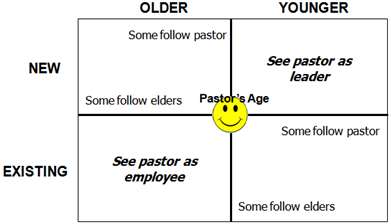Darren has been the pastor of his current church for twelve months. Before he made the transition to the church, he went through an extensive process that included assessments and meetings with denominational leaders and the leaders of the church. He was happy that he would be a good fit for the church. But ever since coming to the church, he has noticed that not everyone sees him the same way. After spending most of the first 12 months working with the church to develop the future vision he is aware some people are on board with the vision and others are not. Why is this happening?
One of the challenges for a pastor (in fact any Christian leader) is to keep from going crazy when receiving mixed messages from people. There are a number of reasons why this happens, but let’s highlight one in particular that I first encountered when talking to a friend of mine, Dr. Bob Logan.
Age and Tenure Differences:
A pastor’s tenure and age are both factors in who sends what kind of messages. The older the church or the longer people have been there, the more they tend to act like they own the church, and the more they perceive the pastor is there to fulfil their agenda. Also, people who are older than the pastor and who were present before his or her arrival are often reluctant to surrender their judgment to the pastor’s suggestions. Thus the pastor has difficulty persuading this segment of the congregation to accept changes.
By contrast, those people who affiliate with the church after the pastor is already there are typically likely to follow his leadership, especially if they’re younger than their pastor. Any new vision that is effective with the younger newer members may be deeply resented by the older, more veteran members who may assume the pastor is taking unwarranted liberties with their church. If the pastor is unskilled in managing the two leadership styles required by age and tenure differences then a schism is likely to develop.
 A pastor must guard against creating awe-they mentality. If pastors think their role allows them to tell the older,more long-term member what to do, they are heading for a very uncomfortable future. For instance, suppose someone comes to you with a great ministry idea.
A pastor must guard against creating awe-they mentality. If pastors think their role allows them to tell the older,more long-term member what to do, they are heading for a very uncomfortable future. For instance, suppose someone comes to you with a great ministry idea.
If that person is an established, key opinion leader in the church, then cite him or her as the source. In most cases, that credibility alone is enough to pre-sell the idea to the other long-term members. After achieving their approval, then interpret the idea in a way that connects with the newer members. Use the word “our” a lot. But suppose a bright idea comes from a newer person, and you become enthusiastic about it and disclose your endorsement before selling the concept to the more long-term members. If these people who are generally older than you and have been at the church longer than you don’t accept the idea, then be careful not to let your sense of frustration cast blame on these resistant senior members. If you report back to the originator of the plan, “They won’t let us do that,” you’ll drive a crack through the middle of the congregation.
If you ever find yourself in this situation, a good starting place is to discover how you respond to potential conflict (or if you know your behavioural responses then review them). As we have seen, age and tenure can cause conflict if not handled right, but conflict in itself is not problematic. If handled properly, conflict can lead to new ideas and behaviour, enhance communication and foster better long-term relationships between individuals and groups.
Add to this the ability to recognize the Situational Factors that are at the base of differences and you are well on the way to creating unity between the newer and older members of the church. Let me suggest Situational Factors generally fall into five categories. They are:
Relationships.
In almost all situations that have the potential to cause problems, a relatively stable and balanced relationship between the parties is needed so individuals can express themselves freely and be heard. Without it, the situation is likely to become distorted, making it difficult to resolve.
Aims.
Personal aims are usually caused by the strongly held, incompatible goals of the parties involved. They arise when one or more of the parties believe that, in order to satisfy their aims, the goals of an opponent must be sacrificed. To head off this kind of thinking, all parties must openly declare their goals so they can be jointly addressed.
Data.
Problems arise when people don’t have the information needed to make an informed decision, are misinformed in some way or interpret information differently. This lack of communication can be easily resolved with a little effort.
Attitudes.
These arise as a result of real or perceived incompatibility in values or beliefs. However, it is important to realise that differing values do not necessarily lead to problems. Attitude disputes are usually caused when people attempt to force their own beliefs or attitudes on others, or do not allow for different views. Spending time trying to discover shared values or beliefs can greatly assist in this process.
Restrictions.
External forces like time issues, insufficient resources, external changes, can all make problems appear like a crisis because every avenue seems to be closed or restricted. It can be helpful for all involved to recognise the external forces and constraints bearing upon them.
Discovering our natural responses to conflict and flexing to get the best result will help avoid the all too common Age and Tenure problems. If a pastor can learn to communicate effectively as well as trust the Holy Spirit to speak to the senior members, he can ask these long-established people where they’re going, and ask their permission to stand at the head of their column. From that position, the pastor can call the younger people to likewise come on board.

Colin is the Director of ResourceZone International. He is a recognized authority in areas like coaching, leadership development, team building, organizational health and growth. He can be reached at info@resourcezoneinternational.com
Related Resources




Comment here